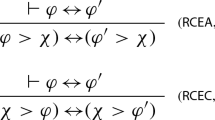Abstract
Conditional logics have traditionally been intended to formalize various intuitively correct modes of reasoning involving (counterfactual) conditional expressions in natural language. Although conditional logics have by now been thoroughly studied in a classical context, they have yet to be systematically examined in an intuitionistic context, despite compelling philosophical and technical reasons to do so. This paper addresses this gap by thoroughly examining the basic intuitionistic conditional logic ICK, the intuitionistic counterpart of Chellas’ important classical system CK. I give ICK both worlds semantics and algebraic semantics, and prove that these are equivalent. I give a Gödel-type embedding of ICK into CK (augmented with an S4 box connective) and a Glivenko-type embedding of CK into ICK. I axiomatize ICK and prove soundness, completeness, and decidability results. Finally, I discuss extending ICK.
Similar content being viewed by others
References
Božić, M., & Došen, K. (1984). Models for normal intuitionistic modal logics. Studia Logica, 43(3), 217–245.
Bull, R. (1965). A Modal extension of intuitionist logic. Notre Dame Journal of Formal Logic, 6(2), 142–146.
Chellas, B. (1975). Basic conditional logic. Journal of Philosophical Logic, 4 (2), 133–153.
Chellas, B. (1980). Modal logic. Cambridge: Cambridge University Press.
Došen, K. (1985). Models for stronger normal intuitionistic modal logics. Studia Logica, 44(1), 39–70.
Dummett, M. (1977). Elements of intuitionism. Oxford: Clarendon Press.
Fischer Servi, G. (1978). The finite model property for MIPQ and some consequences. Notre Dame Journal of Formal Logic, 19(4), 687–692.
Fitting, M. (1969). Intuitionistic logic model theory and forcing. Amsterdam: North-Holland Publishing Company.
Genovese, V., Giordano, L., Gliozzi, V., Pozzato, G. (2011). A conditional constructive logic for access control and its sequent calculus. In Brünnler, K., & Metcalfe, G. (Eds.) Automated reasoning with analytic tableaux and related methods (pp. 164–179). Berlin: Springer.
Genovese, V., Giordano, L., Gliozzi, V., Pozzato, G. (2014). Logics in access control: a conditional approach. Journal of Logic and Computation, 24(4), 705–762.
Glivenko, V. (1929). Sur quelques points de la Logique de M. Brouwer. Académie Royale de Belgique Bulletin de la Classe des Sciences, 15, 183–188.
Hakli, R., & Negri, S. (2012). Does the deduction theorem fail for modal logic? Synthese, 187(3), 849–867.
Kripke, S. (1965). Semantical analysis of intuitionistic logic I. In Crossley, J., & Dummett, M. (Eds.) Formal systems and recursive functions (pp. 92–130). Amsterdam: North-Holland Publishing Company.
Lewis, D. (1971). Completeness and decidability of three logics of counterfactual conditionals. Theoria, 37(1), 74–85.
Lewis, D. (1973). Counterfactuals. Oxford: Blackwell Publishers.
Lowe, E. (1983). A simplification of the logic of conditionals. Notre Dame Journal of Formal Logic, 24(3), 357–366.
McKinsey, J., & Tarski, A. (1948). Some theorems about the sentential calculi of Lewis and Heyting. Journal of Symbolic Logic, 13(1), 1–15.
Nute, D. (1980). Topics in conditional logic. Dordrecht: D. Reidel Publishing Company.
Rasiowa, H., & Sikorski, R. (1968). The mathematics of metamathematics, 2nd edn. Warsaw: PWN.
Segerberg, K. (1989). Notes on conditional logic. Studia Logica, 48(2), 157–168.
Simpson, A. (1994). The proof theory and semantics of intuitionistic modal logic (PhD Thesis). Edinburgh: University of Edinburgh.
Stalnaker, R. (1968). A theory of conditionals. In Rescher, N. (Ed.) Studies in logical theory (pp. 98–112). Oxford: Blackwell.
Williamson, T. (2010). Modal logic within counterfactual logic. In Hale, B., & Hoffmann, A. (Eds.) Modality: metaphysics, logic, and epistemology (pp. 81–96). Oxford: Oxford University Press.
Acknowledgements
The author would like to thank an anonymous referee, Melvin Fitting, and Graham Priest for comments and suggestions.
Author information
Authors and Affiliations
Corresponding author
Rights and permissions
About this article
Cite this article
Weiss, Y. Basic Intuitionistic Conditional Logic. J Philos Logic 48, 447–469 (2019). https://doi.org/10.1007/s10992-018-9471-4
Received:
Accepted:
Published:
Issue Date:
DOI: https://doi.org/10.1007/s10992-018-9471-4




